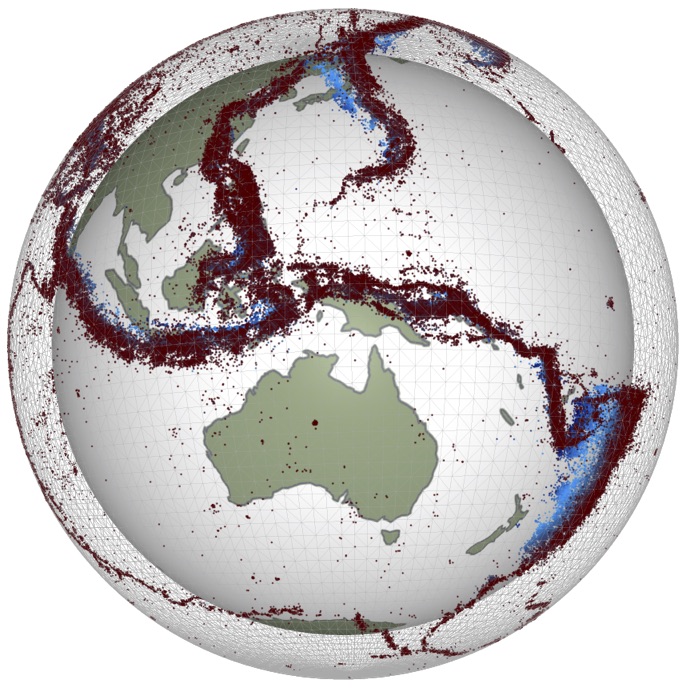Swarm Advection solver test - shear flow driven by a pre-defined, rigid body rotation in a disc#
This example uses the Swarm advection approach rather than SLCN
import petsc4py
from petsc4py import PETSc
import nest_asyncio
nest_asyncio.apply()
import underworld3 as uw
from underworld3.systems import Stokes
from underworld3 import function
import numpy as np
options = PETSc.Options()
# options["help"] = None
# options["pc_type"] = "svd"
# options["dm_plex_check_all"] = None
# import os
# os.environ["SYMPY_USE_CACHE"]="no"
# options.getAll()
import meshio
meshball = uw.meshing.Annulus(
radiusOuter=1.0, radiusInner=0.5, cellSize=0.2, refinement=1, qdegree=3
)
x, y = meshball.X
v_soln = uw.discretisation.MeshVariable("U", meshball, meshball.dim, degree=2)
t_soln = uw.discretisation.MeshVariable("T", meshball, 1, degree=3)
t_soln_dt = uw.discretisation.MeshVariable("Tdt", meshball, 1, degree=3)
t_0 = uw.discretisation.MeshVariable("T0", meshball, 1, degree=3)
DTdt = uw.systems.Lagrangian_DDt(
meshball,
psi_fn = t_soln.sym,
V_fn = v_soln.sym,
vtype = uw.VarType.SCALAR,
degree = 1,
order = 1,
continuous=True,
varsymbol=r'T_s',
fill_param=3,
)
# check that the swarm variable works as a continuous field as well
DTdt.psi_star[0].sym.jacobian(meshball.X)
# Create adv_diff object
# Set some things
k = 0.01
h = 0.1
t_i = 2.0
t_o = 1.0
r_i = 0.5
r_o = 1.0
delta_t = 1.0
adv_diff = uw.systems.AdvDiffusion(
meshball,
u_Field=t_soln,
V_fn = v_soln,
DuDt = DTdt,
solver_name="adv_diff_swarms", # not needed if coords is provided
order=1,
)
adv_diff.constitutive_model = uw.constitutive_models.DiffusionModel
adv_diff.constitutive_model.Parameters.diffusivity = k
# Create a density structure / bu()oyancy force
# gravity will vary linearly from zero at the centre
# of the sphere to (say) 1 at the surface
import sympy
radius_fn = sympy.sqrt(
meshball.rvec.dot(meshball.rvec)
) # normalise by outer radius if not 1.0
unit_rvec = meshball.rvec / (1.0e-10 + radius_fn)
# Some useful coordinate stuff
x, y = meshball.X
r, th = meshball.CoordinateSystem.xR
# Rigid body rotation v_theta = constant, v_r = 0.0
theta_dot = 2.0 * np.pi # i.e one revolution in time 1.0
v_x = -r * theta_dot * sympy.sin(th)
v_y = r * theta_dot * sympy.cos(th)
with meshball.access(v_soln):
v_soln.data[:, 0] = uw.function.evaluate(v_x, v_soln.coords)
v_soln.data[:, 1] = uw.function.evaluate(v_y, v_soln.coords)
# Define T boundary conditions via a sympy function
import sympy
abs_r = sympy.sqrt(meshball.rvec.dot(meshball.rvec))
init_t = sympy.exp(-30.0 * (meshball.N.x**2 + (meshball.N.y - 0.75) ** 2))
adv_diff.add_dirichlet_bc(0.0, "Lower")
adv_diff.add_dirichlet_bc(0.0, "Upper")
with meshball.access(t_0, t_soln):
t_0.data[...] = uw.function.evaluate(init_t, t_0.coords).reshape(-1, 1)
t_soln.data[...] = t_0.data[...]
# Validation - small timestep
# delta_t = 0.01
# adv_diff.solve(timestep=delta_t)
def plot_T_mesh(filename):
if uw.mpi.size == 1:
import numpy as np
import pyvista as pv
import underworld3.visualisation as vis
pvmesh = vis.mesh_to_pv_mesh(meshball)
swarm_points = vis.swarm_to_pv_cloud(adv_diff.DuDt.swarm)
tsoln_points = vis.meshVariable_to_pv_cloud(t_soln)
swarm_points.point_data["T"] = vis.scalar_fn_to_pv_points(swarm_points,adv_diff.DuDt.psi_fn)
pvmesh.point_data["T"] = vis.scalar_fn_to_pv_points(pvmesh,t_soln.sym)
pvmesh.point_data["V"] = vis.vector_fn_to_pv_points(pvmesh,v_soln.sym)
pl = pv.Plotter(window_size=(1000, 750))
pl.add_arrows(pvmesh.points, pvmesh.point_data["V"], mag=0.0001, opacity=0.75)
# pl.add_points(
# swarm_points,
# cmap="coolwarm",
# render_points_as_spheres=False,
# point_size=20,
# opacity=0.66,
# )
pl.add_mesh(pvmesh, cmap="coolwarm", opacity=0.75)
pl.screenshot(
filename="{}.png".format(filename),
window_size=(1280, 1280),
return_img=False,
)
# pl.show()
with meshball.access(t_0, t_soln):
t_0.data[...] = uw.function.evaluate(init_t, t_0.coords).reshape(-1, 1)
t_soln.data[...] = t_0.data[...]
adv_diff.DuDt.update(dt=0.05)
# # Update the swarm locations
# swarm.advection(
# v_soln.sym,
# delta_t=0.05,
# corrector=False,
# restore_points_to_domain_func=meshball.return_coords_to_bounds,
# )
# Advection/diffusion model / update in time
delta_t = 0.05
expt_name = "output/rotation_test_k_001"
plot_T_mesh(filename="{}_step_{}".format(expt_name, 0))
for step in range(0, 10):
adv_diff.solve(timestep=delta_t, verbose=False)
tstats = t_soln.stats()
print("psi*", adv_diff.DuDt.psi_star[0]._meshVar.stats())
if uw.mpi.rank == 0:
print("Timestep {}, dt {}".format(step, delta_t))
print(tstats)
plot_T_mesh(filename="{}_step_{}".format(expt_name, step))
# savefile = "output_conv/convection_cylinder_{}_iter.h5".format(step)
# meshball.save(savefile)
# v_soln.save(savefile)
# t_soln.save(savefile)
# meshball.generate_xdmf(savefile)
# check the mesh if in a notebook / serial
if uw.mpi.size == 1:
import pyvista as pv
import underworld3.visualisation as vis
pvmesh = vis.mesh_to_pv_mesh(meshball)
swarm_points = vis.swarm_to_pv_cloud(adv_diff.DuDt.swarm)
tsoln_points = vis.meshVariable_to_pv_cloud(t_soln)
swarm_points.point_data["Ts"] = vis.scalar_fn_to_pv_points(swarm_points, adv_diff.DuDt.psi_star[0].sym[0] )
pvmesh.point_data["T"] = vis.scalar_fn_to_pv_points(pvmesh,t_soln.sym)
pvmesh.point_data["Ts"] = vis.scalar_fn_to_pv_points(pvmesh,adv_diff.DuDt.psi_star[0].sym[0])
pvmesh.point_data["V"] = vis.vector_fn_to_pv_points(pvmesh,v_soln.sym)
pl = pv.Plotter(window_size=(1000, 750))
pl.add_arrows(pvmesh.points, pvmesh.point_data["V"], mag=0.02, opacity=0.75)
pl.add_points(
swarm_points,
cmap="coolwarm",
render_points_as_spheres=False,
scalars="Ts",
point_size=10,
opacity=0.66,
)
# pl.add_mesh(pvmesh, cmap="coolwarm", opacity=0.75, scalars="T")
# pl.remove_scalar_bar("T")
# pl.remove_scalar_bar("mag")
pl.show()
# savefile = "output_conv/convection_cylinder.h5".format(step)
# meshball.save(savefile)
# v_soln.save(savefile)
# t_soln.save(savefile)
# meshball.generate_xdmf(savefile)
DTdt.psi_fn
